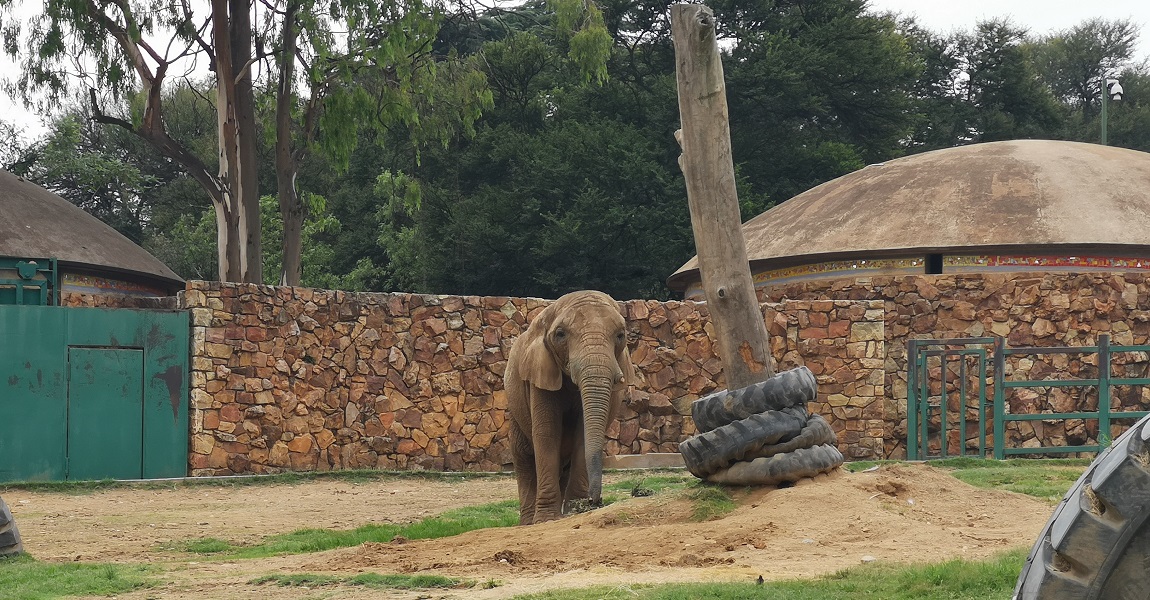Lonely Lammie the elephant lives all by herself at the Johannesburg Zoo. Her partner of 17 years, Krinkel, passed away of unconfirmed causes last year. Since then, there have been calls by environmentalists to release the elephant into a wild reserve. But these calls have fallen on deaf ears.
Lammie was born in captivity and is now 39 years old. Her parents, Jumbo and Dolly, were captured from the wild in the 70s. They died in captivity within a year of each other. Her brother, also born at the zoo, died after he was sold to a French zoo.
Johannesburg Zoo said they plan to acquire another elephant to keep Lammie company, but animal welfare and elephant experts have objected. They say she should be released into a wild reserve where she can roam free and bond with a herd. This, they say, is especially important because of the grief and trauma Lammie has previously experienced.
The elephant is a social animal
Like humans, elephants are social creatures. They are known to develop strong social group bonds and losing companions can result in significant grief and trauma. It’s not healthy for them to live in isolation. “Just as we consider solitary confinement punishment for humans, we should also be thinking that way about elephants,” elephant behaviour specialist Professor Caitlin O’Connell said in an interview with National Geographic.
Death has a huge impact on elephants too. Repeated losses in the absence of the traditional healing structures of the elephant family and culture cause sustained psychological trauma, a trans-species psychologist who researches the effects of violence on elephants and other animals Dr Gay Bradshaw said in an interview with IOL.
Lammie is likely suffering significant grief and trauma given her family history and the loss of her partner. Elephant specialists believe the best way for Lammie to heal is to be with other elephants.
Audrey Delsink, executive director of Africa’s Humane Society International, said: “In order for Lammie to thrive emotionally and physically, she needs to be placed in a semi-wild facility that does not support human-elephant interactions and where she can express natural behaviours. The zoo should be making immediate plans to unite Lammie with other female elephants of differing ages to mimic a herd and the critical ‘family’ structure that is essential to an elephant’s social well-being and learning experience.”
Research also shows that elephants have a shorter lifespan when they live in captivity
Despite the various protests that animal rights activists have held in support of Lammie being released, the zoo has stood firm for her to remain.
On zoos and animals in captivity
On Friday morning I visited Lammie at the zoo. I remember Lammie and Krinkel from school excursions to the zoo and volunteering there in high school. Elephants are my favourite animals, and watching them feels like a gift. They are majestic to behold: giant in size but so graceful it looks like they’re walking on clouds.
After years since I had been there, I couldn’t ignore how uncomfortable it felt to be at the zoo. Zoos are strange places. They allow visitors to gape and gawk at wild animals kept in little enclosures that mimic their natural environment. We come in big groups and small, armed with snacks and smartphones, to spectate and document these animals. It feels unnatural: like the animals are imprisoned for entertainment.
I understand that zoos keep animals in captivity for conservation, education, and research. Zoos can be havens for endangered species, some even have breeding programmes for these endangered species. These zoos expose people to animals that they could otherwise not see, and instil a love of animals in children. Frequent visits to the zoo as a child is one of the reasons I love animals, and am awed by them, as an adult.
But when holding an animal in captivity is bringing them more harm than good then we cannot support that. The average lifespan of elephants is 60 years, which means Lammie has a good 20 years to live. I hope that the people in charge make the right decision before it’s too late.
And as the fate of Lammie’s future hangs in balance, I can’t help but think it tragic that humans have the right to decide the fate of other creatures.









